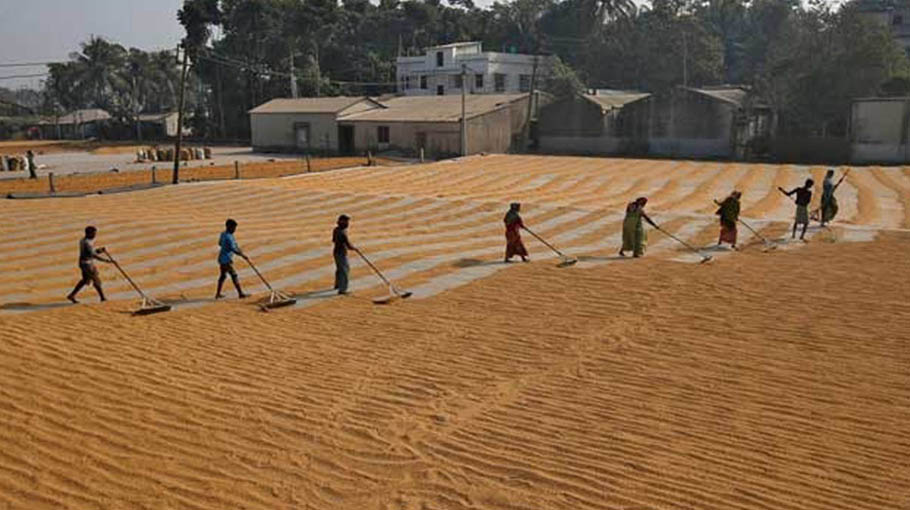Rice price rises in Rangpur, buyers unhappy

The rice market in the north, known as the granary of the country, has once again become volatile due to the sudden price increase of rice. Although the harvest of Aman paddy started in the beginning of autumn, the price of rice has been increased in the market.
In terms of quality and variety, the price of the product has increased from Tk 150 to Tk 200 per bag (50 kg) in the last one week. Consumers have demanded market monitoring to curb the price of rice in times of crisis for the common people before the transplanted Aman paddy goes home.
According to retailers and wholesalers, the prices of all types of rice have gone up due to arbitrary pricing by a handful of rice mill owners. They are blaming the rice mill owners and rice corporate companies of North Bengal for this turmoil.
According to agronomists, although the north plays an important role in the country's agro-based economy, farmers in the region are being deprived of a fair price for each crop. At the beginning of the harvest, flocks of brokers descend on the market. They force farmers to sell crops at low prices. In this case, the broker syndicate adopts different strategies.
Read more: Aman harvesting goes on in full swing in Bogura
In many cases, they lend money to farmers in advance. In repaying the loan, the farmer is forced to sell the crop at a lower price. Each season, about 600 auto rice mill owners in the north hire brokers to build stocks of paddy. They control the market by collecting paddy from field level farmers. In addition, stockpile traders syndicate and enter the field during the paddy season. Later they control the market as they wish by increasing the price.
Talking to retailers of different rice markets including Rangpur City Bazar, it is learned that a few days ago Miniket rice was sold at Tk 52 per kg, now it is being sold at Tk 62 per kg. The price of Nazirshail rice has also increased by five to seven TK per kg and is being sold at 64 to 65 Tk. Sacks of Indian imported Nurjahan rice (50 kg) are being sold in the current market at Tk 2,100 to Tk 2,200.
The price per kg rice is 42 to 44 Tk. Milon Sikder, director of Chowdhury Traders, a rice warehouse in Mahiganj area of the city, said that last week, a sack of Miniket rice (50 kg) was worth Tk 3,000, with a current market price of Tk 3,200, while Bridhan-28 (84 kg) was worth Tk 3,300, the current market price is Tk 3,500. Bridhan-49 (84 kg) has been sold at Tk 3,650 to Tk 3,800.
Traders in the wholesale market believe that there is a manipulation behind this unusual increase in the price of rice. The owners of big auto rice mills have increased the price of rice on various pretexts by buying and stocking paddy at low prices.
According to mill owners, rice traders, retailers and farmers, about 800 auto rice mill owners in the north are controlling the price of rice by building their own stockpiles. The auto rice mills are stockpiling paddy in huge amount and setting the price of rice at their own discretion. Expressing concern, ordinary traders say that after planting transplanted Aman paddy seedlings in the area, working people do not have jobs. In the month of Ashian-Kartik, they were dragged into their family till the harvesting of paddy started.
On top of that, they have lost their way as the prices of essential commodities including rice continue to rise. Hundreds of truckloads of rice from Rangpur's Mahiganj, Dinajpur's Pulhat, Bogura, Naogaon and Rajshahi go to different parts of the country including Dhaka, Chattogram and Khulna every day. Rice mill owners have been raising the price of rice for several days in these places on the pretext of hostile weather. If the government does not take action against these illegal hoarders now, this syndicate will destabilize the rice market.
Abu Patwari of Rangpur, Mohid Chowdhury and several other storekeepers said that they could not collect rice due to big rice mills. The owners of these rice mills are unilaterally collecting rice from the market and controlling the rice market at will. They said that 500 to 600 big traders and auto rice mill owners are controlling the rice business in the whole northern region. Unable to compete with the big traders, many small rice mill owners have closed their mills.
Small rice traders say rice mill owners are now supplying less rice than before, including raising rice prices at the mills. As a result, they have to buy at higher prices. This is forcing them to sell at higher prices at the retail level. On the other hand, mill owners and warehouse keepers say that the price of paddy has gone up at the farmer level as the government's paddy and rice procurement has gained some momentum this time. In different parts of the country, the price of paddy has gone up by a maximum of Tk 100 per quintal. Following this, the prices of all types of rice have gone up in the big storehouses and mills of the country. Now this has affected the retail and wholesale market.
Abul Kashem, general secretary of Rangpur Rice Mill Owners' Association, directly blamed the auto rice mills for the rise in rice prices, saying auto rice mill owners were already controlling the market by building stocks of paddy. As a result, small traders have become helpless, as they cannot keep up with the auto rice mills. The auto rice mills have increased the prices of all types of rice in addition to stocks due to adverse weather conditions.




